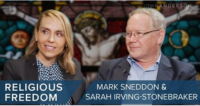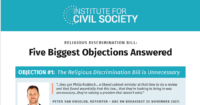An all-party NSW Parliamentary Joint Select Committee Report has made detailed recommendations for a NSW Government Bill to protect people and organisations from discrimination based on their religious belief or activity.[1] The Committee’s Report deserves strong support.
Federal, State and Territory anti-discrimination laws all prohibit discrimination based on race, gender, disability, age, sexual orientation and gender identity.
But people and organisations in NSW who suffer discrimination based on their religious belief or activity have no protection under NSW anti-discrimination law. That gap in NSW legislation also limits federal Fair Work Act protection for NSW people from such discrimination.
This is a gap that has been long recognised and needs to be fixed urgently.
The Ruddock Expert Panel on Religious Freedom received over 15000 submissions and recommended in 2018 that the New South Wales and federal Parliaments should amend their anti-discrimination laws to prohibit discrimination on the basis of a person’s ‘religious belief or activity’ including on the basis that a person does not hold any religious belief and that the law provide for the appropriate accommodations for religious bodies, religious schools and charities.
The NSW all-party Committee report:
- has called on the NSW government to urgently introduce a Government Bill to amend the Anti-Discrimination Act 1977 to protect individuals and groups and organisations from discrimination on the ground of religious belief (or lack of belief) or activities motivated by religious belief.
- has provided a very good model for such a law because it has thoughtfully considered a range of issues about individual and group religious expression and the need for religious organisations to be free to reflect their ethos for example in their employment and conduct policies.
The Committee’s model is superior in many respects to the last draft of the federal Religious Discrimination Bill.
The Committee’s model is vastly superior to the simplistic alternative proposed by some of just substituting “religion” for “age” or “disability” in stock standard antidiscrimination amendments. That alternative does do the necessary work for a religious discrimination statute of engaging with issues around prohibiting discrimination on the grounds of speech and action based on convictions (as opposed to discrimination on the grounds of physical attributes like sex or age or disability) and prohibiting discrimination against groups and organisations (which are organised around religious convictions) as well as against individuals.
Many of the most significant provisions recommended by the Committee for adoption in a Government Bill (as set out below) represent the first occasion in which such a protection has been recommended by any Parliamentary Committee in the history of Australian anti-discrimination law. ICS endorses all of these:
- A mechanism by which the conflict between religious freedom and other human rights may be reconciled. The Committee’s recommended Bill does this by using the international Siracusa Principles based on international law as recommended by the Commonwealth Expert Panel on Religious Freedom (Ruddock Review).
- A definition of ‘religious activities’ that includes activities motivated by religious beliefs and protects religious activities in secular contexts subject to certain limits.
- A test for ‘religious belief’ that has regard to the claimant/respondent’s ‘sincerely’ held religious convictions, thus avoiding judges having to act as theologians to identify and interpret religious doctrines to determine if a belief “conforms” to an identified religious doctrine.
- Recognition that the right not to be discriminated against for holding and expressing religious beliefs and activities should be protected through positive provisions as a right, not as an “exemption” from other anti-discrimination rights.
- A better test for determining whether conduct by religious organisations is consistent with or furthers or aids religious belief.
- Specific protections are to be offered to employees, professionals and students for statements made outside the workplace.
- Secular workplaces cannot impose ‘genuine occupational requirements tests’ to stifle religious expression by employees.
- The State Government should be bound by the Bill, thus protecting, for example, the religious body that is told by the Principal of a State school whose hall it hires that it cannot teach its religious view of marriage in the hall.
- The recommended Bill rejects the reasoning used by some that if an employer asserts it would discipline both a religious and non-religious employee for doing and/or saying the same thing, there must have been no discrimination against the person of religious belief.
- The recommended Bill recognises that organisations as well as individuals may be the subject of discrimination, thus protecting religious bodies, schools and charities.
There are small number of areas where the Committee’s recommendations should be improved on in consultation. For example, the Committee’s recommendation that the State Government can discriminate in the administration of laws or grants or funding on the grounds of religious belief or activity against an organisation or individual that provides a service to a segment of the population needs re-thinking. This recommendation would allow the State to use laws or funding conditions to require religious schools to teach material or to tolerate or promote conduct which was inconsistent with the school’s religious beliefs and ethos.
The Committee’s recommended form of a Government Bill deserves strong support. It should be legislated urgently by the NSW Government.
[1] https://www.parliament.nsw.gov.au/ladocs/inquiries/2603/Report%20on%20JSC%20on%20the%20Anti-Discrimination%20Amendment%20(Religious%20Freedoms%20and%20Equality)%20Bill%202020.pdf








Recent Comments